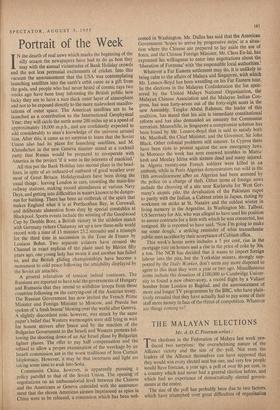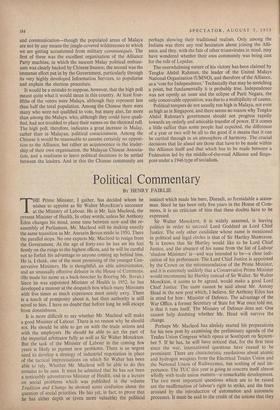THE MALAYAN ELECTIONS
Mr. A. D. C. Peterson writes : HE elections in the Federation of Malaya last week pro- duced two surprises : the overwhelming nature of the Alliance victory and the size of the poll. Not even the leaders of the Alliance themselves can have supposed that they would win every elected seat but one, and very few people would have forecast, a year ago, a poll of over 80 per cent. in a country which had never had a general election before, and which had no experience of democratically elected govern- ments at the centre.
The size of the poll has probably been due to two factors, which have triumphed over great difficulties of organisation and communication—though the populated areas of Malaya are not by any means the jungle-covered wildernesses to which we are getting accustomed from military communiqués. The first of these was the excellent organisation of the Alliance Party machine, in which the nascent Malay political enthusi- asm was clearly backed by Chinese finance; the second was the immense effort put in by the Government, particularly through its very highly developed Information Services, to popularise and explain the election procedure.
If would be a mistake to suppose, however, that the high poll meant quite what it would mean in this country. At least four- fifths of the voters were Malays, although they represent legs than half the total population. Among the Chinese there were many who were not qualified to vote, but many also, far more than among the Malays. who, although they could have quali- fied, had not troubled to place their names on the electoral roll. The high poll, therefore, indicates a great increase in Malay, rather than in Malayan, political consciousness. Among the Chinese it would be reasonable to assume certainly no opposi- tion to the Alliance, but railer an acquiescence in the leader- ship of their own organisation, the Malayan Chinese Associa- tion, and a readiness to leave political decisions to be settled between the leaders. And in this the Chinese community are perhaps showing their traditional realism. Only among the Indians was there any real hesitation about joining the Alli- ance, and they, with the fate of other triumvirates in mind, may have wondered whether their own community was being cast for the role of Lepidus.
The overwhelming nature of his victory has been claimed by Tengku Abdul Rahman, the leader of the United Malays National Organisation (UMNO), and therefore of the Alliance, as a 'vote for Independence.' Technically that may be stretching a point, but fundamentally it is probably true. Independence was not openly an issue and the eclipse of Parti Negara, the only conceivable opposition, was due to a multiplicity of causes.
Political tempers do not usually run high in Malaya, not even as high as in Singapore, and there seems no reason why Tengku Abdul Rahman's government should not progress rapidly towards an orderly.and amicable transfer of power. If it comes a little earlier than some people had expected, the difference of a year or two will be all to the good if it means that it can be carried through in an atmosphere of harmony. The crucial decisions that lie ahead are those that have to be made within the Alliance itself and that which has to be made between a Federation led by the middle-of-the-road Alliance and Singa- pore under a 1946 type of socialism.



































 Previous page
Previous page